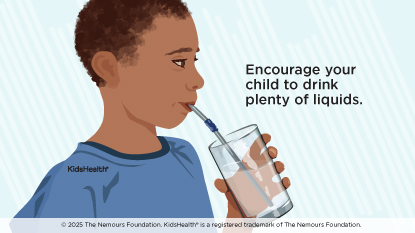Dehydration happens when there is not enough water in the body. In children, it is often caused by vomiting, diarrhea, or not wanting to drink because of mouth sores or a sore throat. Kids can also get dehydrated when they do a lot of physical activity, especially in hot weather.
Your child stayed in the hospital to get fluids through an IV (intravenous or into a vein) line or a nasogastric tube (a thin flexible tube that goes into the nose and down to the stomach). They are now ready to go home.
At home, give plenty of liquids and an oral electrolyte solution (such as Pedialyte® or a store brand) as recommended by your health care provider to help your child recover from dehydration. You can buy the oral electrolyte solution at drugstores or supermarkets without a prescription.
Here's how to take care of your child.



Your child:

Your child:
You know your child best. If your child has symptoms that worry you or seems very sick, call your health care provider or take your child to the ER.

How can I prevent dehydration? It helps to:
How do oral electrolyte solutions help keep someone hydrated? These solutions contain a balanced mix of water, electrolytes (sodium, chloride, and potassium), and sugars (glucose). They give someone the fluids they need and replace the liquids and electrolytes that are lost through diarrhea or vomiting. This helps prevent or treat dehydration and keep the body's electrolytes balanced.
Is dehydration dangerous? Mild dehydration in healthy children usually isn't dangerous. But dehydration that gets more severe can cause the body to shut down and can even become life-threatening.